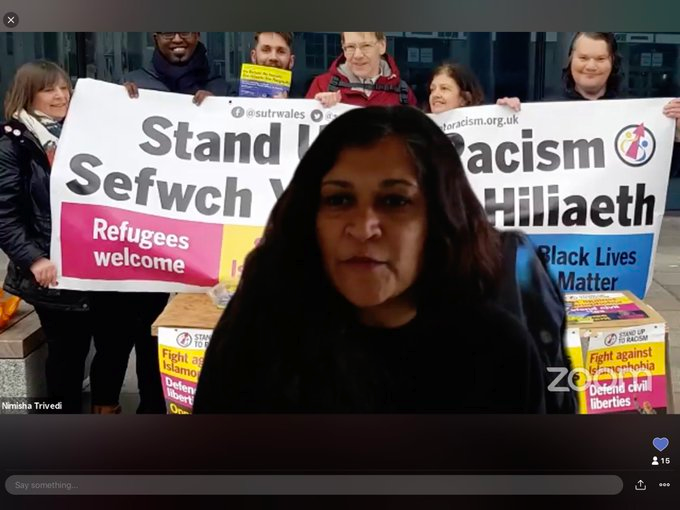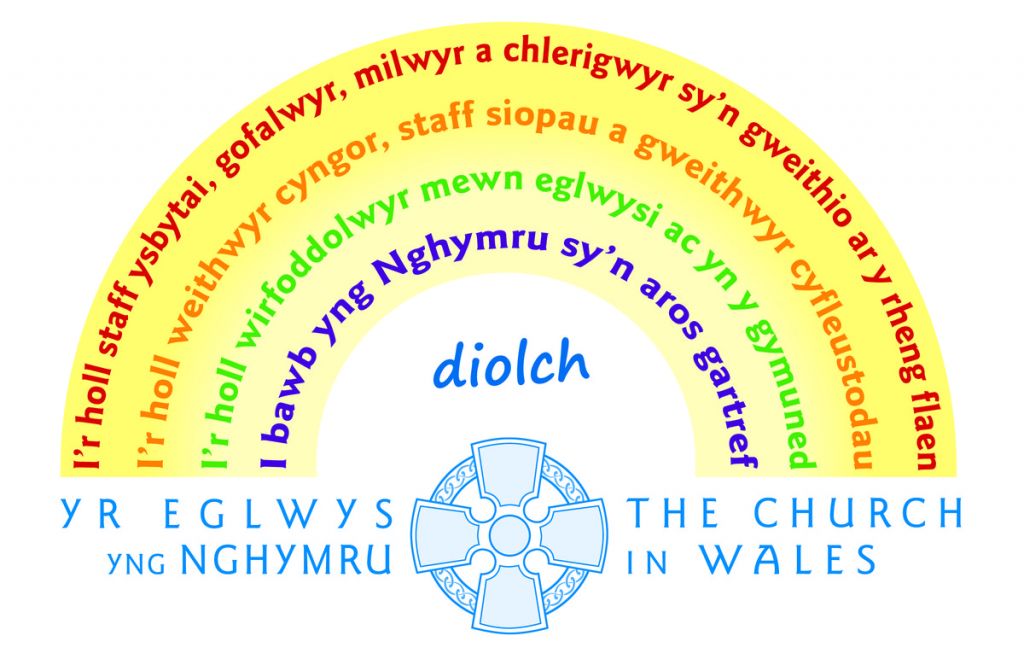A START ON REOPENING PLACES OF WORSHIP IN WALES
In line with steps already taken in other nations of the United Kingdom, Welsh Government announced on June 19 that churches and other places of worship who wish to reopen for local individuals and households to pray separately may do so from June 22. It will be a matter for the appropriate authority at denominational or local level to decide how (and whether) to do so.
This is part of the careful move from Lockdown to the Red phase in Welsh Government’s programme Unlocking our economy and society: continuing the conversation. If Coronavirus continues to subside in Wales, it is expected that further steps will be taken in forthcoming weeks.
During the Red phase, places of worship will also still be able to hold funerals for a limited congregation (although most Christian denominations in Wales have chosen so far not to take up this opportunity), hold weddings with a limited congregation (but until the General Register Office permits, only the Church in Wales has the ability to register such marriages), and a worship leader may use the place of worship to record or broadcast services publicly.
Cemeteries and gardens around places of worship may be kept open, foodbanks and blood donor sessions may be held (provided that physical distancing can be maintained). Providers of childcare for ages 0-12 have been informed that they may open to more children than just the children of essential workers from June 22, and this will include some providers who use church premises. Places of worship are not obliged to take up these opportunities if they do not feel it is appropriate, and should not re-open unless they are satisfied that it is safe to do so.
Church and faith community authorities may also use the Red phase to prepare for further easing in the Amber phase, which is likely to begin gradually on July 6, and some corporate activities may be permitted in places of worship later in July. Links to the guidance provided by Welsh Government and (where appropriate) the UK Government and other official bodies which could be of help to these authorities in preparing, are available on the Cytûn website – https://www.cytun.co.uk/hafan/en/covid-19-briefing-paper/ – which will be updated regularly as matters develop.

Cytûn was invited to participate in the All Wales International Anti-racism Online Protest in Wales on Saturday 13th June which attracted almost 6,000 participants.
In English, Welsh and other languages speakers of different ages and backgrounds told their own moving stories of encountering racism.
In terms of policy development, key speeches were given by Judge Ray Singh and Lord Simon Woolley. Both have been actively involved in enabling the processes that have been established by the Welsh Government in response to the disproportionate number of BAME COVID-19 deaths. It’s anticipated that the sub-group, which includes Aled Edwards from Cytûn, will be forwarding policy recommendations to the First Minister. The Deputy First Minister and Chief Whip, Jane Hutt MS, spoke at the protest and offered initial responses to the speakers.
CHURCH COMMUNITY ACTION
DURING LOCKDOWN

Sasha Perriam of Cytûn has been keeping track of the activities of local churches and ecumenical groups. Some work is undertaken by churches on their own, others are in partnership with other faith groups and voluntary organisations. Here are a few highlights from the dozens of examples Sasha has found.
Carmarthen churches have continued to operate and support their food bank. They have also supported Glangwili hospital patients who do not have personal hygiene goods (because there are no visitors); a community initiative that pays for the making of visors at Ysgol Bro Myrddin for workers in the health sector; and enhanced support to the local women’s refuge.
In Swansea, an emergency Food Resource has been based at Christ Well URC, Manselton. This has enabled support to be offered to, amongst others, asylum seekers known through the asylum seeker and refugee group Unity & Diversity (UiD). They are also looking to set up a Clothes Bank.
The ASK Centre, based in Christ Church, Rhyl, aided by a delivery of bread from Henllan Bakery (above), has continued to operate its foodbank for those in need, and the CAB based at the centre has (like other CABs) continued to offer a service via telephone and email.
In Newport, Community House Eton Road (CHER; Presbyterian Church in Wales), has arranged regular Zoom meetings to get Community Leaders in touch with people who are in need of help with food parcels, computers and internet access for children, in partnership with EYST (Ethnic Minority Youth Support Team), ‘Me in Mind’, and a Community Connector. Their BBC Children in Need funded youth workers have also continued to engage with local young people remotely. Four other Christian churches meet at Community House – a Caribbean church, an Ethiopian/Eritrean church, a Slovakian church and another Eastern European church. CHER has arranged meetings to provide information about what help is available and what is allowed or not during the current situation. Most of the people attending Community House, including these four churches, are from BAME Communities or from Eastern Europe. Covid-19 has hit this community particularly hard.
In Neath, a group of people from churches contact those living alone and who would normally receive a home visit, to check that they are coping or if they need help. A church is designing letters of the alphabet which spell out Faith, Hope Love and this collage will be displayed in the church when they meet again. The Foodbank is still open and before lockdown one church was open to provide food for anyone in need. The sewing group in a local church have been making face masks which are being sold and money donated to local charities including staff of NHS.
Links to online worship by Cytûn’s member churches, in English and Welsh, can be found on: https://www.facebook.com/CytunNew/ To include a service, please email peredur@cytun.cymru. Cytûn member, Cyngor Ysgolion Sul Cymru, provides a comprehensive portal accessing Welsh language worship, devotional and educational material at http://cristnogaeth.cymru/
HOUSING THE HOMELESS AFTER COVID-19
On May 28, Welsh Government held an online Summit, led by Julie James MS, Minister of Housing and Local Government. The aim of the event was to communicate to leaders from local government and the housing sector, their plans for transforming homelessness services.
The event was attended by nearly 200 people, and speakers included Katie Dalton, CEO of Cymorth Cymru, Jon Sparkes, CEO of Crisis and Clare Budden CEO of ClwydAlyn Housing.

During the event the new guidance Phase 2 – Planning Guidance for Homelessness and Housing Related Support Services was explained laying out the requirements for Local Authorities. The four key themes were:
- – continue to support people who remain sleeping rough, everyone in emergency provision and those newly presenting
- prepare clear transition plans for services setting out how they will move towards providing more sustainable models of accommodation and support
- innovate, remodel, procure and build accommodation to improve the quality of emergency provision
- how to rapidly move away from the use of night shelters and ‘floor space’
It was also explained, that the sector must link in and collaborate with local voluntary and faith based groups in order to harness their local and community knowledge and support they can offer.
Bonnie Navarra, Director of Housing Justice Cymru, spoke as a representative of faith based and voluntary groups to outline how local authorities could effectively involve these groups in the planning, transitioning and delivery of this new approach. Bonnie took the opportunity to outline the significant benefit volunteer led organisations bring and the positive outcomes from existing service models, such as Night Shelters. She went on to say that it is important for faith based groups and the voluntary sector to be a part of the new service models, given the unique strengths they bring. Finally, she said they can transition and be part of this new approach, by focusing their resources on prevention, and Housing Justice Cymru were keen to help wherever needed.
NO EXTENSION FOR BREXIT TALKS
At a meeting with representatives of the European Union on June 12, Michael Gove MP, Chancellor of the Duchy of Lancaster, confirmed that there would be no extension to the transition period before the UK leaves the EU’s Single Market and Customs Union on 31 December 2020, despite calls to the contrary from the Welsh Government and over 50 civil society organisations across the UK, who called for an extension in an open letter to the Prime Minister.
The letter, signed by Revd Dr Noel Davies on behalf of Cytûn’s Wales and Europe Working Group, asked the PM to extend the transition period because of the impact Covid-19 was having on the sector, highlighting that: “The capacity of the UK and the EU states to make the domestic preparations needed to exit the transition period and implement the Withdrawal Agreement has already been severely limited.” The letter points to the “understandably” reduced capacity of the Government to negotiate a trade deal, and for Parliament to then scrutinise this deal, given the current focus on supporting those individuals, communities, and organisations that have been hardest hit by Covid-19.
TEACHING RELIGION, VALUES AND ETHICS IN OUR SCHOOLS
The latest stage in Welsh Government’s programme of engagement regarding the new curriculum for schools in Wales from September 2022 has begun.
Legislative proposals for Religion, Values and Ethics proposes a new legal framework to underpin the teaching of what has previously been known in schools as Religious Education. The new document does NOT outline the intended curriculum content for the subject – that will follow in the autumn.
The document recommends:
The (paradoxical) consequence of this is that the county agreed syllabus will not be taught as agreed except in voluntary aided schools when requested by parents.
The website Law and Religion has published an interesting article about the changes by Russell Sandberg, which has provoked an interesting discussion on the site.
The full consultation can be read on the Welsh Government website, and individuals, families, churches and schools can respond until 28 July 2020. Due to the varied views of our members, Cytûn will not be drawing up a comprehensive response in favour or against the proposals, but all member churches and others interested are encouraged to respond directly.
Climate Sunday: churches launch year-long environmental campaign
Churches are being urged to focus on climate change in a new initiative. From holding a climate focused service to calling for bolder government action, churches are asked to take part in the Climate Sunday campaign ahead of the COP26 global climate meeting in November 2021.
It starts on September 6, the first Sunday in the annual season of Creationtide, and is being organised by Churches together in Britain and Ireland and Cytûn, with support from many member churches and charities including CAFOD, Christian Aid, Tearfund, A Rocha UK, and Operation Noah. Churches are encouraged to hold a local Climate Sunday any time during the year and there will be free resources to suit every tradition and style of worship. They are invited to:
- Hold a climate-focused service, to explore the theological and scientific basis of creation care and action on climate, to pray, and to commit to action.
- Make a commitment as a local church community to taking long term action to reduce its own greenhouse gas emissions.
The culmination of the campaign will be a national Climate Sunday event on Sunday 5th September 2021, to share church commitments and pray for bold action and courageous leadership at COP26.
Revd Judith Morris, General Secretary of the Baptist Union of Wales, said: “Climate Sunday is a crucial opportunity for all churches to take much needed action to address one of the most urgent and pressing issues facing our planet. As stewards of God’s creation, it is paramount that we actively engage with climate change and commit to protecting the future for generations to come. We need to make changes before it is too late and we hope that this initiative will galvanize all Christians in Wales into action.”
Canon Carol Wardman, spokesperson for the Church in Wales’ environmental group, CHASE (Church Action for Sustaining the Environment), said, “Our heightened appreciation of the nature over the past weeks has reminded us how precious is the natural environment around us. We have all enjoyed cleaner air, quieter roads, clearer skies, and hearing the song of the birds. But the extreme weather this year, with devastating winter floods followed by the driest spring on record, have brought home to us the impact of climate change.
“Climate Sunday is an opportunity to focus together on how we can better care for God’s creation, and remind ourselves that we must not treat protection of the environment as a luxury, but place it at the heart of our plans to recover from the pandemic emergency. We encourage all our churches to take part in whichever way they can.”
To register for Climate Sunday visit the website: www.climatesunday.org. Find out more about the initiative by reading a blog by Andy Atkins, CEO of A Rocha UK and Chair of the Climate Sunday Steering Group: www.climatesunday.org/blog

If you do not want to wait until September, a number of Climate Sunday partners – including ARochaUK, CAFOD, Cymorth Cristnogol, Tearfund, the United Reformed Church, the Society of Friends and the Salvation Army – have arranged a virtual lobby of Westminster for a just recovery from Covid-19, The Time is Now, on 30 June 2020 under the auspices of the Climate Coalition.
The photo above shows St Joseph’s Church, Cwmaman, which was the first solar powered church in the Church in Wales.
ABOLITION OF INTERNATIONAL DEVELOPMENT DEPT OPPOSED
On June 16, UK Prime Minister Boris Johnson announced that the Department for International Development (DfID) would be abolished and merged with the Foreign Office. Christian Aid, CAFOD, Tearfund and other faith-based charities have written to Mr Johnson asking him to reconsider this decision. So has the International Group of the Church in Wales, who say, We were, frankly, appalled at your description of overseas aid being regarded as ‘a giant cashpoint in the sky’ by the world’s poor. The shocking level of tax avoidance practised by multi-national companies, shirking their responsibilities to countries where they source their raw materials, employ cheap labour, or take advantage of lax regimes, rather implies that the ‘cashpoint in the sky’ is delivering money from poor countries to rich, rather than the other way round.
Should churches invest in oil companies?
Christian charity Operation Noah has published a new report: ‘Church investments in major oil companies: Paris compliant or Paris defiant?’ The report shows the gap between the practices of major oil companies and the Paris Agreement targets, and calls on churches in the UK to urgently divest from fossil fuels to tackle the climate emergency. It highlights that Shell and BP intend to spend huge sums on exploration and extraction of new reserves this decade. Shell and BP are planning to increase oil and gas production by 38% and 20% respectively between 2018 and 2030, when global carbon emissions must fall by 55% by 2030 in order to limit the global average temperature rise to 1.5°C, according to the 2019 UN Emissions Gap report.
Rt Revd Dr Rowan Williams, former Archbishop of Wales and Archbishop of Canterbury, said in response to the report: ‘The current health crisis has highlighted as never before the need for coherent international action in the face of global threat. Can we learn the lesson and apply it to the global threat of climate change? To do so means taking practical and effective steps to reduce our lethal dependence on fossil fuels, and this report challenges the Churches to take these steps as a matter of urgency.’
CONTACTING CYTÛN’S POLICY OFFICER
Gethin Rhys, Cytûn’s Policy Officer, has been awarded a period of sabbatical study leave by Cytûn’s Board of Trustees, to be taken in three parts. During the period July 13 – August 10 2020, Gethin will be following some online university courses about climate change to improve his understanding of the scientific aspects of this crisis.
During this period, Gethin will not be engaged in his regular work for Cytûn. If you require an urgent reply, you are asked to contact Revd Aled Edwards, Chief Executive of Cytûn (aled@cytun.cymru), but please be aware that Aled will not be able to reply to all routine enquiries. Arrangements have been made for other members of Cytûn and denominational staff to deputise for Gethin at meetings where possible. The Chair of Cytûn’s Wales & Europe Working Party, Revd Dr Noel Davies, will deputise for that aspect of Gethin’s work, and volunteers from the Inter-faith Council for Wales will deputise for Gethin at meetings of the Third Sector Partnership Council.
Cytûn – Churches Together in Wales
Room 3.3, Hastings House, Fitzalan Court (opposite Brunel House), Cardiff CF24 0BL
Office tel: 03300 169860
E-mail: post@cytun.cymru www.cytun.co.uk
Twitter @CytunNew
Publication date: 19 June 2020. The next bulletin will be published on 24 August 2020.
